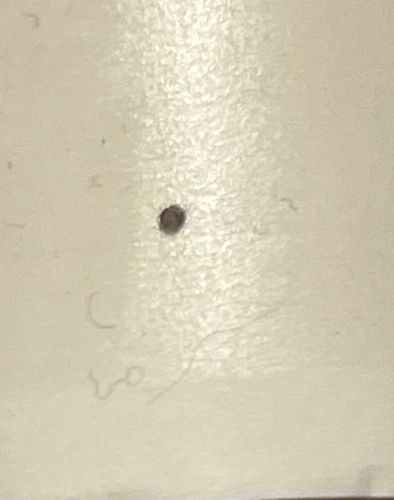Carpet beetle (likely larval stage or a very small adult)
Scientific Name: Dermestidae (family), possibly Anthrenus verbasci (Varied Carpet Beetle)
Order & Family: Coleoptera, Dermestidae
Size: (Adults) 2-4 mm, (Larvae) 4-5 mm (the object in the image appears smaller, suggesting it could be a very young larva or a small adult)

Natural Habitat
Indoors: carpets, rugs, furniture, closets, stored food products, taxidermy, animal products. Outdoors: nests of birds and insects, flowers where adults feed on pollen.
Diet & Feeding
Larvae feed on a wide variety of animal and plant products, including wool, silk, fur, feathers, leather, dried meat, dead insects, pet food, and sometimes synthetic fibers if soiled with oils or food. Adults typically feed on pollen and nectar.
Behavior Patterns
Larvae are often found in dark, undisturbed areas. They are known for their slow movement and characteristic bristles. Adults are attracted to light and may be found near windows. The lifecycle involves egg, larva, pupa, and adult stages, with larval development possibly taking several months to a year depending on conditions and food availability.
Risks & Benefits
Risks: Can cause significant damage to textiles, stored food, and other organic items in homes and museums. They do not bite or transmit diseases but can cause allergic reactions in some sensitive individuals due to their shed hairs. Benefits: Some species are used in forensic entomology to estimate time of death due to their carrion-feeding habits. In nature, they act as scavengers, breaking down organic matter.
Identified on: 10/1/2025